I had taken some time off from writing about Ma. It was the end of the year, when everyone seems to be celebrating, and the contradiction between what I could see outside, and how I felt inside, was just too much to bear. I visited Europe, first alone, to Romania, to look at where we used to live between 2001-2004, and then with my family, to Austria and the Czech Republic, to look at the sights. During all this, my depression got the better of me.
It is now late January 2016. I have pulled myself back up to get back to recounting her life.
Back to Ma’s story, then.
Ma’s being able to breathe literally breathed (no pun intended) new life into her. After a couple of days in Intensive Care, she was pronounced fit to go home. We thought the hospital was trying to get her out too soon, but according to the staff there, with the support equipment that she would get at home – a vacuum pump to manually clean her breathing tube of mucus, a moisturizing pump to ensure her breathing system was as moist as a normal person’s should be, and an oxygen pump to help her with breathing, should she need it – she would be fine at home. We were taught how to clean the new tube in her throat. This cleaning, and constant moisturizing, was critical for her, since without moisture, her airway would be blocked by dry mucus in a matter of a few hours. With some trepidation, we took Ma back home, to my house in the early afternoon.
The problems started almost immediately, and they had nothing to do with her body, for a change. The company that was supposed to have her medical equipment at our house before she was discharged from hospital did not deliver her moisturizing unit. Without occasional cleaning of her airway, Ma began to show signs of discomfort in a matter of hours. By later in the evening, her blood pressure had shot up. She was having trouble breathing, and we could hear how raspy her breathing sounded. I called an ambulance to take her to Emory Johns Creek, a hospital 3 miles from my house.
The staff in Emergency at the hospital were able to get her airway moisturized and cleaned in a matter of a couple of hours. She was then admitted to the hospital and moved to her room. I spent the night there.
The next morning, her doctor came in to examine her. One of the tests she ran was to see if she had any blood clots in her limbs, because her right arm looked swollen. On finding one, she prescribed a blood-thinner – a drug that makes it more difficult for blood to clot – so that the clot would dissolve and not lodge somewhere in her lungs, where it could potentially kill her.
What the doctor probably hadn’t bargained for was that Ma’s tracheostomy surgery was still fresh. That wound needed to close, because it was still bleeding on the inside. Also, when Ma’s airway was cleaned, the cleaning tube inevitably scratched her airway, and that bled a little. Now, with the blood-thinner, her wound and her bleeding from these scratches was almost constant.
By the time evening came around, she was not doing well. I went home to sleep during the day, and returned to be with her during the night. When I walked into her room, she was coughing, and every cough shot out a little fountain of blood through the tube in her throat. It was very, very upsetting. There was a team of medical personnel dealing with her, so I stepped out of the room, along with Bhavya, and found myself unable to hold back tears of sorrow and frustration. It was just one calamity after another! I remember a medical technician passing me, coming out of her room, and standing beside me to say that I shouldn’t worry, that he had seen much worse, and they had all lived.
Eventually, Ma was stabilized and cleaned up, and went back to sleep. They had stopped her blood-thinner, so things were projected to improve slowly.
She slept fitfully, and so did I. At about 8 am, she became visibly uncomfortable again. Her breathing was erratic, she was sweating profusely, and she just did not look good. I got the staff nurse to call the Emergency team. She had gone into acute respiratory failure.
Her hospital bed was rolled out to the Intensive Care Unit (ICU). Bhavya had arrived by then to relieve me, and she joined me in the ICU. Emory Johns Creek is part of the famous Emory Hospital, which is about 25 miles away from Emory Johns Creek. When we took Ma into the ICU room, the team of Emergency staff was guided by a doctor at Emory Hospital, through a video conference system.
Ma was petrified with fear. The nurses were trying to lift her off her ward bed to move her onto the ICU bed, but she just wasn’t listening to them, even actively resisting their efforts to move her. She simply didn’t want to be horizontal, because that eliminated whatever capacity she had to breathe. When they failed, after several attempts, I told them that they needed to let me do this. She was sitting up, drenched in sweat, very stiff and afraid, looking at nobody, when I went up to her and told her I was going to move her to the other bed. She recognized me and relaxed immediately, and I picked her up, and, keeping her head higher than the torso, moved her to her ICU bed. The jacket I was wearing that morning was soaked in her sweat. I was so attached to her memory that I didn’t have that jacket cleaned until December 2015, 10 months after this event.
The remote doctor determined that she needed to be sedated, and her breathing needed to be assisted by putting her on a ventilator. Soon, Ma had gone to sleep, and a ventilator technician came in to attach her to the ventilator. The machine helped her breathe properly by imposing a rhythm on her respiratory activity. Her moisturizing system was also in place, and so was the regular cleaning of her airway.
Late that evening, everything was stable. She was breathing comfortably. I had been home for a few hours, and returned to be with her through the night. One of the nurses came up, and we struck up a conversation. When she found out I was going to stay the night, she asked me why. My response was that Ma was going to be around for a very short time, so I felt it was only proper that she have me with her during her last days. Her words to me were very helpful. She said, in the nicest way, that that might be true, but Ma wasn’t going anywhere that night, and that I should go and get some rest at home, while Ma was looked after by professionals. After all, she said, I was going to be no good if I was always tired from a lack of rest.
I remember having to make the very tough decision to follow her advice, which I knew was correct. I left, felt so torn that I came back, and repeated that process a few times. Then I drove home, and sunk into a deep sleep, for the first time in weeks.
Over the next ten days, Ma’s condition improved. Her bleeding had stopped. She was taken off the ventilator and moved to the General Ward. We were advised that her seriously advanced terminal disease was best taken care of using Hospice Care, which is typically home-based care for terminally ill people who are not expected to last six months. Before she was discharged from the hospital, we had selected a hospice care agency for her, which promised all manner of glorious assistance for her last phase of life.
Ma was moved to Dabloo’s house. The hospice agency had made sure she had a hospital-like bed to lie down on, and also that all the life support equipment she needed was in place before she went home.
She also began receiving the radiation therapy she had started just before she almost died. The therapy was localized to one tumor, and we were reminded by the doctor that the radiation would shrink that one tumor within about two weeks, but the tumor would start growing again in about 4 weeks after that. Her other tumors would continue to grow. Her life expectancy, based on this timeline, was about 6-8 weeks.
By this time, I had realized that nothing doctors or hospitals could do could help Ma. Her cancer was classified as terminal for a reason – it was based on the experiences of a whole body of specialized doctors, and their collective wisdom. I knew Ma wasn’t going to get better without a miracle. My search for a miracle cure had led me to several herbal remedies, but only one of them appeared to have some merit. Unfortunately, this herb was heavily regulated, and research in it had only begun recently. Still, there was some evidence that it improved the quality of life of cancer patients, and there was anecdotal evidence that it even delayed the effects of the disease, with some accounts going so far as to claim a total cure. Hoping for a miracle, Ma obtained this herb and started ingesting it regularly.
The other realization for all of us was that there was simply no way we could care for Ma the way we had been. She was sicker now, so constant care and company were needed day and night. All of us, but particularly Papa, Dabloo, and I, had been spending about 16 hours a day for months on making sure Ma was all right. When she was in hospital, the demands on us became even greater, since she did not like to be alone, without at least one of us around her, even during the night.
As a result, we had interviewed and selected two helpers. Elvia, who had been hired in January 2015, was hired so that she could help Ma during the day, as well as cook for all of us. She didn’t have any nursing experience, but she was extremely diligent and hardworking.
We also hired Natasha, a Certified Nursing Assistant, to help Ma during the night. Natasha turned out to be a pillar of support for us. Not only did she do her job well, she also helped get other attendants for Ma when necessary. With her in the house, or in the hospital when Ma was admitted during the next few months, we knew that medication was going to be administered on time, Ma was going to get a gentle massage to help her sleep, and in all respects was going to be looked after. Natasha was also a big believer in natural foods and naturopathy, so she also helped us prepare natural foods that would help Ma.
We clashed with the company providing hospice care to Ma. Apparently, Ma wouldn’t be seen by a doctor any more, even if she had a problem that needed medical attention. Instead, a nurse would come and see her twice a week for an hour, and convey concerns to a doctor. Other than that, she was on her own. Even her feeding equipment, which needed to have an automated pump to feed her through her stomach tube slowly, was the reason for a loud fight with them, because according to them there was nothing wrong with stuffing her full of liquid food – never mind that that made her very uncomfortable.
Eventually, come March 2015, the hospice company was forced out of the picture, but in a way that was hardly cause for joy. After several days of generally calm life, Ma began to feel breathless and anxious one evening. Her blood pressure shot up. We called the hospice nurse to describe what was happening to Ma, and stressed the fact that she needed to have medical care immediately. The nurse told us she couldn’t arrive to see Ma for at least 45 minutes, but we could give Ma some Morphine and put her to sleep. Sedating someone who can’t breathe is a good recipe for putting them to sleep permanently, so we refused, and called an ambulance.
In the Emergency room, they quickly discovered that a plug had formed inside Ma’s breathing tube, which was why she was having such difficulty breathing. As soon as the doctor realized what the problem was, he got another breathing tube, made sure Ma was aware that she was going to have a strange experience, and then pulled out her tube from her throat. Ma convulsed, and coughed out a huge ball of blood and mucus through the hole in throat. Right away, before that hole could start closing, the doctor inserted the new tube, then secured it in place. Just like that, Ma’s airway was open, and she could breathe.
They admitted her to the hospital. That meant hospice care was no longer involved, and we signed the appropriate termination papers gladly. Others may feel differently, but our experience of hospice care was that it meant almost no care, and a general propensity to – in unsaid words but obvious actions – hasten the end of a patient’s life.
This hospital stay marked the beginning of a strange phase in Ma’s life. Although she would come back to the hospital a few more times before she passed away, the duration of each stay shrank. Also, her subsequent hospital visits happened because of lung infections picked up on this particular stay. None of the subsequent stays was really serious, except the final one, of course.
I noticed also that all the physical decline that we had been told would start showing never happened. For example, her need to be in bed should have resulted in worsening bedsores, which come about from constant pressure on one’s body from lying in bed. She did have bedsores in February and March 2015, but they started disappearing in April 2015, even though her weakness meant she spent a lot of time lying or sitting. Her skin gained lustre. Her hair began to grow back.
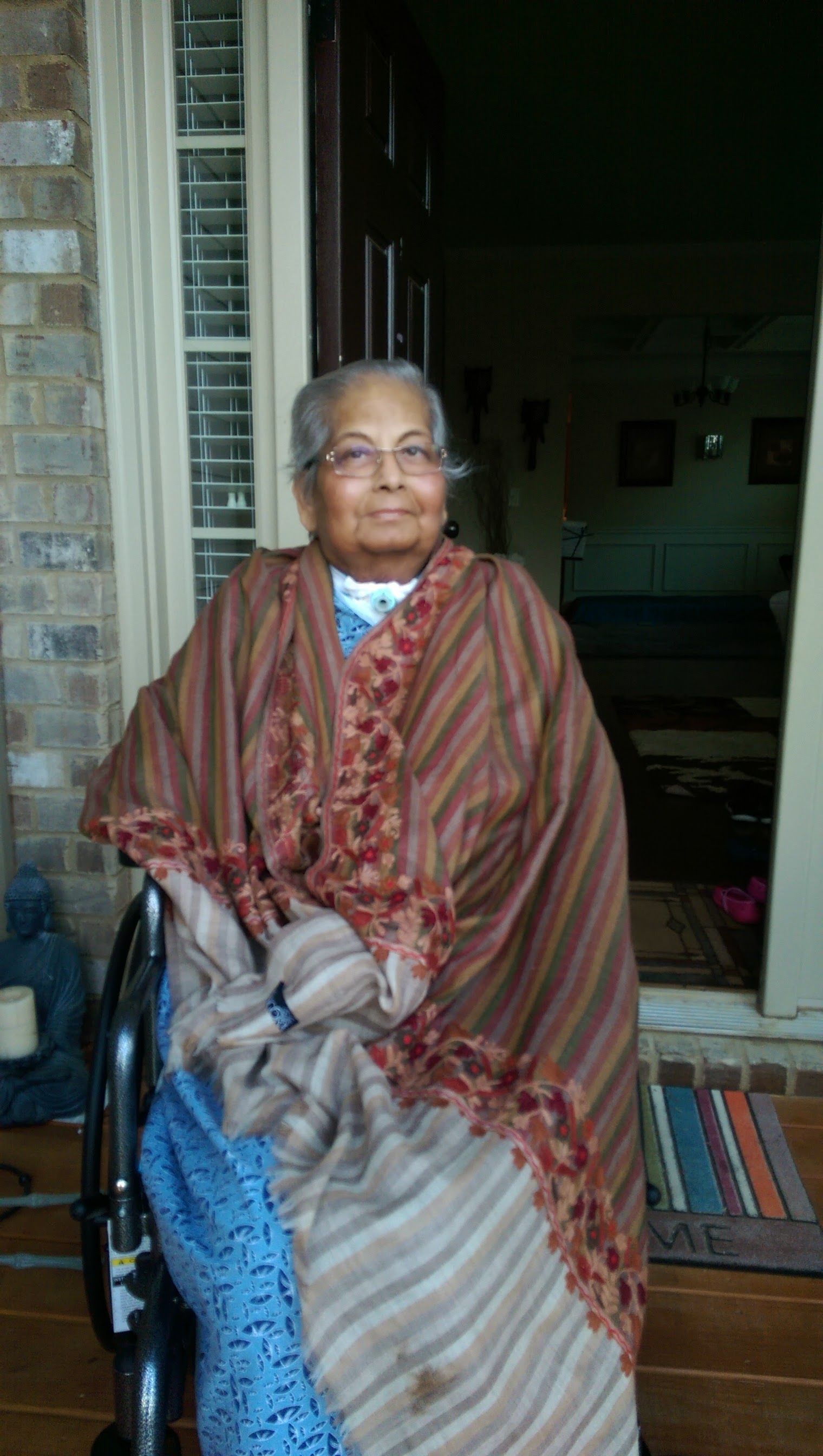
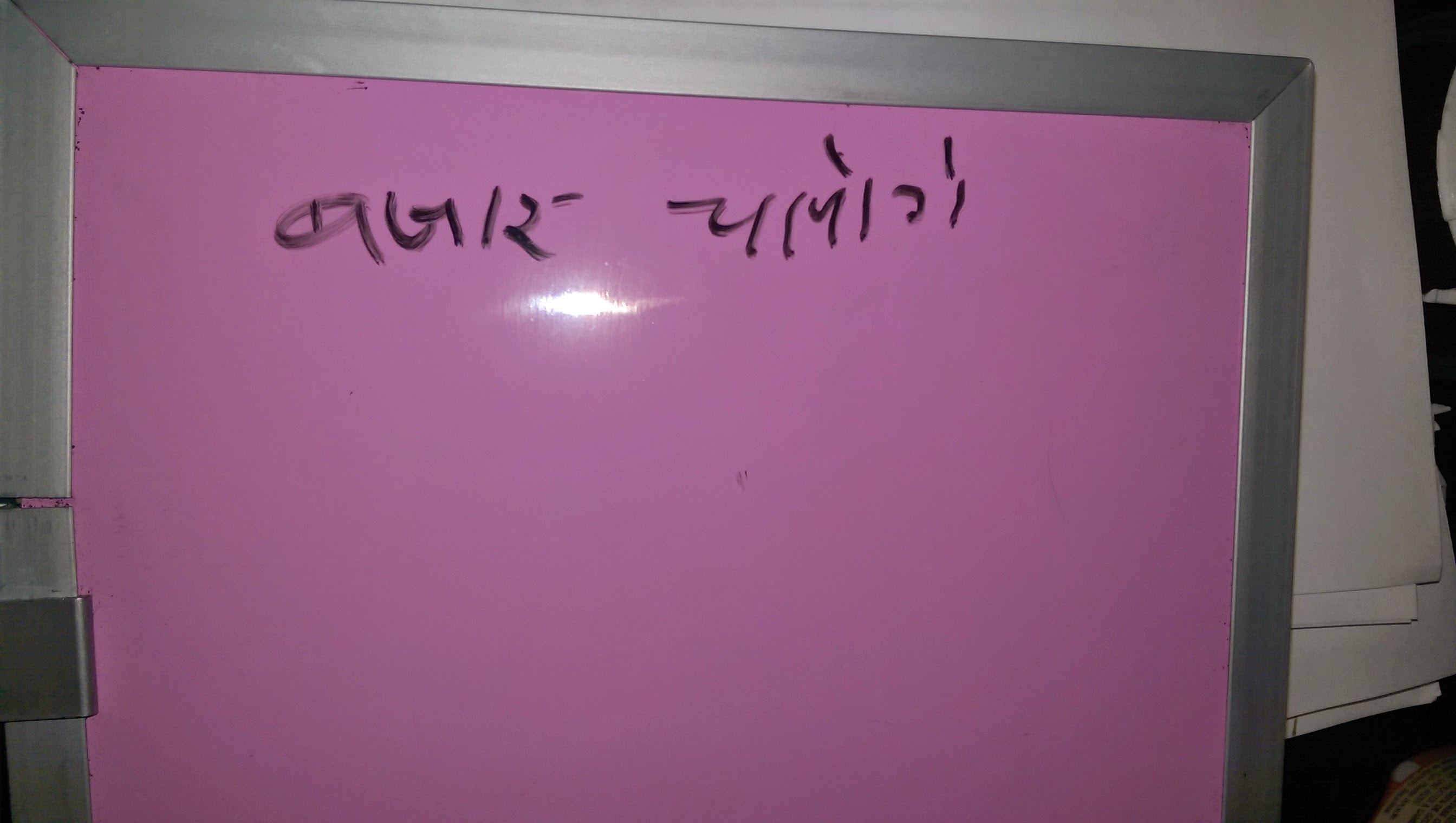
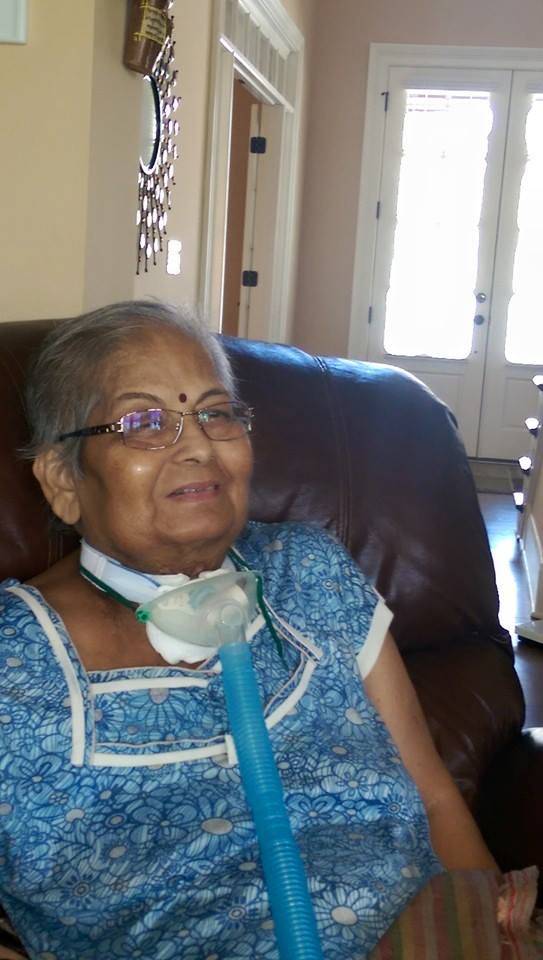
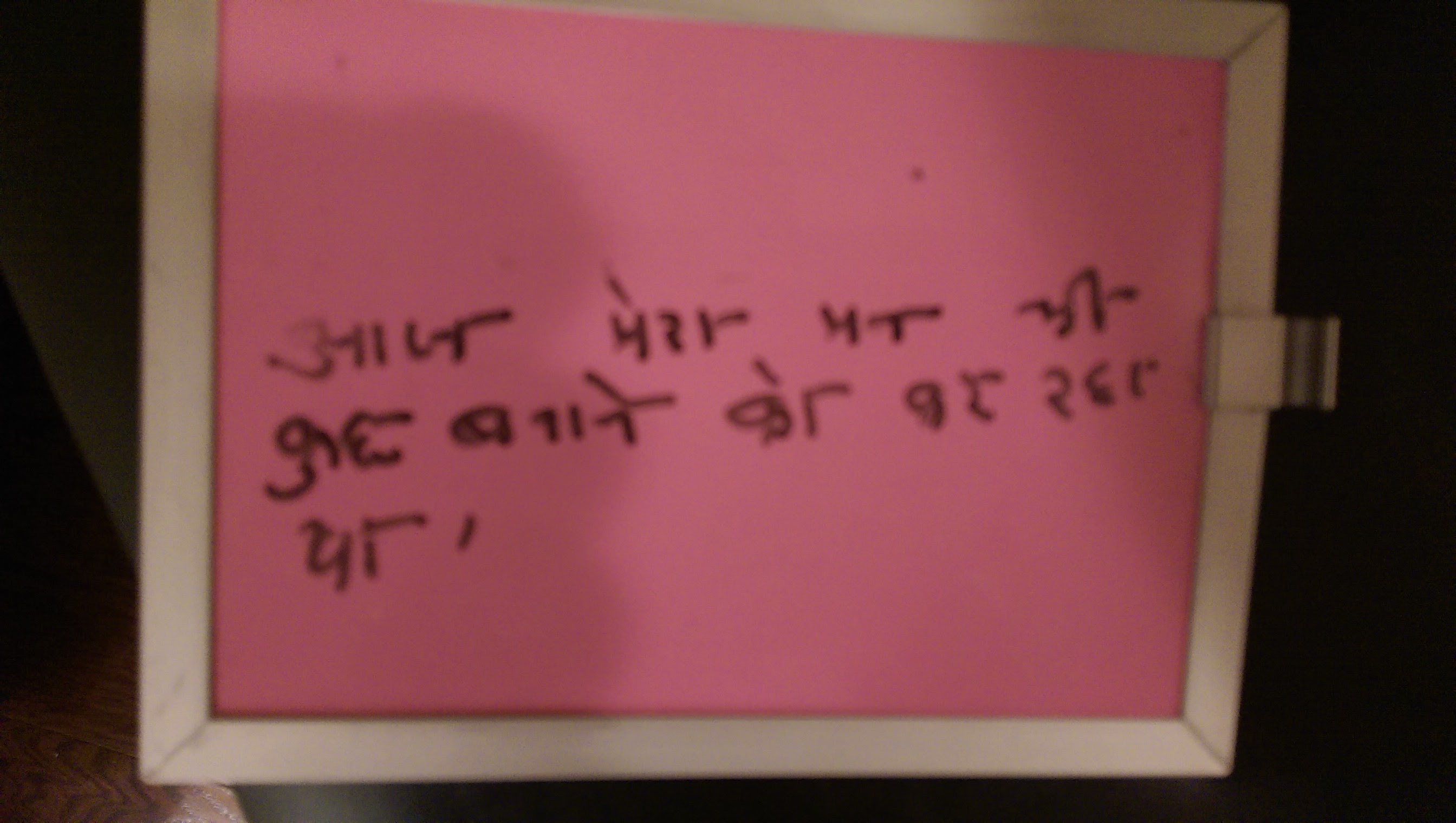
Her strength started to emerge again. Her sense of humor had never left her, but now she was actively engaged in her life, to the point that she wanted to go out and shop, or help with the cooking. And all this while, I was asking myself, shouldn’t her body be shutting down? It was now mid-April 2015. Her radiation therapy should have ceased to matter by that time.
Her glasses had needed to be replaced for a while, but we just hadn’t had an opportunity to get new ones for her. One afternoon, she said she wanted to go and have them changed, so we got into my car and went to the local optician’s store. Testing her for a new prescription proved to be impossible because of her equipment and the position of the optician’s chair, but she did order a pair of new glasses with her current prescription. A few days later, she was wearing then. I must admit, I had never dared to hope that she would be around long enough for them!
On one of her shorter hospital visits, she expressed a need to eat – something she had been told she could not do because of her breathing tube. There is a strong chance that people with breathing tubes can chew food and send it down their windpipe, which is obviously a grave danger. This happens because once you get a breathing tube, your body very quickly forgets how to swallow and breathe at the same time. Anyway, to prove to Ma that her medical condition precluded eating anything by mouth, the hospital ran a swallow test. Imagine our amazement when the results showed that her swallowing mechanism was as good as a healthy person’s!
By the end of April 2015, she looked and felt so much better that we decided to get back in touch with her oncologist, who had never followed up on her condition after that dark evening in February. He asked us to bring her in. When she walked into his office, his staff and he gaped at her in amazement! He came into the exam room and asked Ma how she was. Ma looked quite defiant and mouthed the Hindi words for ‘you can see I am still here’. She knew he had given up on her too soon.
Dr. Krishnamachari examined her. “I have to admit, I never imagined I would see you again”, he said. “Members of my staff came up to me to tell me how good you look! Now, I can’t find any obvious problems, everything looks good, but let’s make sure by running a PET scan.”
Ma had the PET scan on 30 April 2014. Her results came back the week after. Dr. Krishnamachari read them out to me over the phone. Every one of her several tumors had gone down significantly in size and activity. Her main cancer, in her esophagus, had disappeared completely! I could not believe my ears. After I put the phone down, I told myself there must have been something wrong with what I understood because the doctor didn’t seem to make a big deal out of how Ma was showing signs of less cancer after almost 3 months without treatment, when she should have been showing very much the opposite symptoms. I called the doctor back and confirmed with his staff that my understanding was correct.
The only thing that Ma had been getting, in the way of treatment, was the herb I mentioned above. Either that herb or her own body had worked to push the cancer back hard enough that she was empirically better, not just superficially so.
She still had cancer, so we were not out of the woods yet, but at least we all felt better about her condition. More important, she felt better, and she was walking around, exercising, engaging in life. Imagine this: she was breathing and eating through tubes, she couldn’t move her upper right arm because her biggest tumor had dead tissue that was pressing up against the nerves that controlled that movement, she couldn’t speak because of the tube in her throat, but she wanted to live, wanted to fight, and – at least at that time – had kicked her cancer’s posterior in a big way. This was the best example you will ever find of the phrase ‘to pull back from the brink’!
Ma and I shared a special closeness. All mothers are close to their children, we all know, but Ma and I were specially close because of how I had almost died before I was born, and how she had saved me.
In the early morning of January 21, 1968, Ma went into labor. A midwife called Momin was summoned to my maternal grandfather’s home, where Ma was supposed to give birth. It sounds unusual, doesn’t it? Apparently, back in the 1960s, it was far more common where Ma’s family lived.
No one was expecting complications, but by about 7 am, I had not made my way into the world, despite Ma’s and Momin’s best efforts. We have come to believe that Ma had gestational diabetes, which causes babies to grow larger than normal. Anyway, I was much larger than the norm, and the midwife simply could not deliver me.
Ma was exhausted. Momin, fearing complications from a failure to deliver, and the septic shock that could result if I died in the womb, suggested to Ma and my grandparents that she kill me by rupturing my head, drain my brains, thereby minimizing my size, and then get me out of the womb. As a matter of fact, she had already started hitting my head before she explained all this.
Ma wouldn’t hear of it. She refused to entertain the idea. My grandparents were aghast, as well. Who imagines that the birth of a child will turn into an either/or scenario, with the life of the mother in the balance?
As luck would have it, Dr. Jang Bahadur Singh, a prominent physician, was out on his morning walk at that very moment. He passed by my grandparents’ home, and asked what all the commotion was about. As soon as he found out, he swung into action. A few minutes later, I was delivered, bloody, severely bruised, to the extent that – my grandmother tells me – one couldn’t make out where my eyes ended and my nose started. But because of Dr. Singh’s efforts, and Ma’s refusal to allow me to be killed, I am here today.
I was nursed back to health over the next few months. In time, I grew to be a healthy infant. I was so attached to Ma that for the first few years of my life, she wouldn’t go anywhere that I couldn’t go. My aunt – my father’s sister – used to live next door, with her family. The few times Ma dared to go anywhere without me, after I had gone to sleep in the evening, my aunt would take care of me. If I woke up, she would cover herself with one of Ma’s sarees and comfort me to coax me back to sleep.
For several years in the early 1970s, Ma suffered terribly from a kidney stone. I still recall her popping a pill called Baralgan whenever the pain became too much to bear. Sometime, the medicine would do nothing for her, and she would go into a pain-induced stupor. At those times, Papa discovered that the only way to bring her back to her senses was to put my hand in hers.
That closeness had never gone away, but the events of the last year had now brought it back to the fore. Most evenings, Ma would go to bed at about 10 pm, about 30 minutes after Natasha arrived for her night shift. We would move all of Ma’s equipment to her bedroom, giver her her medication, and then I would make sure to put my arm around her, and then put my forehead up against hers, and just feel the warmth of her love for me. “Mera beta! (My son)”, she would mouth, and I’d respond, “Meri mummy! (My mother)”. This simple act is one of my most treasured memories of our time together.
Based on her increased vitality, as opposed to the expected decline, physical and voice therapists began visiting her to help her strength and speech. Her physical therapist always expressed surprise at how strong Ma’s body was, even after being ravaged by disease for so long. Ma’s speech therapist discovered that her speech was obstructed by the large breathing tube in her throat, because that tube blocked any air from traveling up through her vocal chords. The size of the tube had proven to be a mixed blessing. In the beginning, it was the only thing that had kept Ma’s airway open, because the tumor was pressing in too hard for a narrower tube to make a difference. Now that the tumor seemed to be less of a factor, the size of the tube made her retch too often to be comfortable. We contacted Dr. Browning, the surgeon who had saved her life, and he agreed to put a narrower tube in.
With the narrower tube, Ma’s sessions with the speech therapist produced sounds and words for the first time in months. I was not with Ma when she said her first words, but Dabloo called me and gave her the phone. Ever funny, Ma said to me in a clear whisper/croak, “Kya haal hai, Babloo? (How are you, Babloo)”. I burst out laughing in amazement. I hadn’t expected her to say that much.
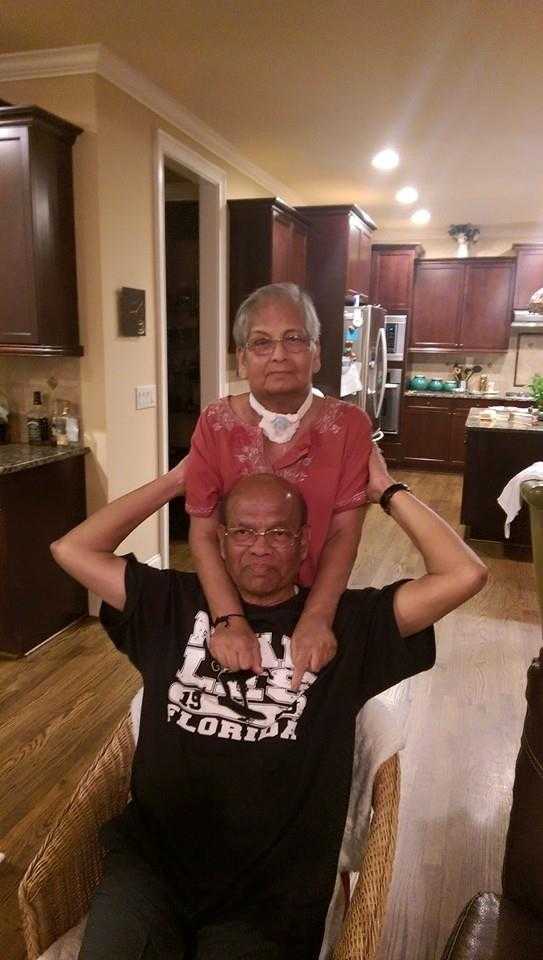
May ended with a celebration for Ma’s and Papa’s 49th wedding anniversary. What a difference one year had made! The had arrived just the day before their 48th anniversary, and so much had happened since then.
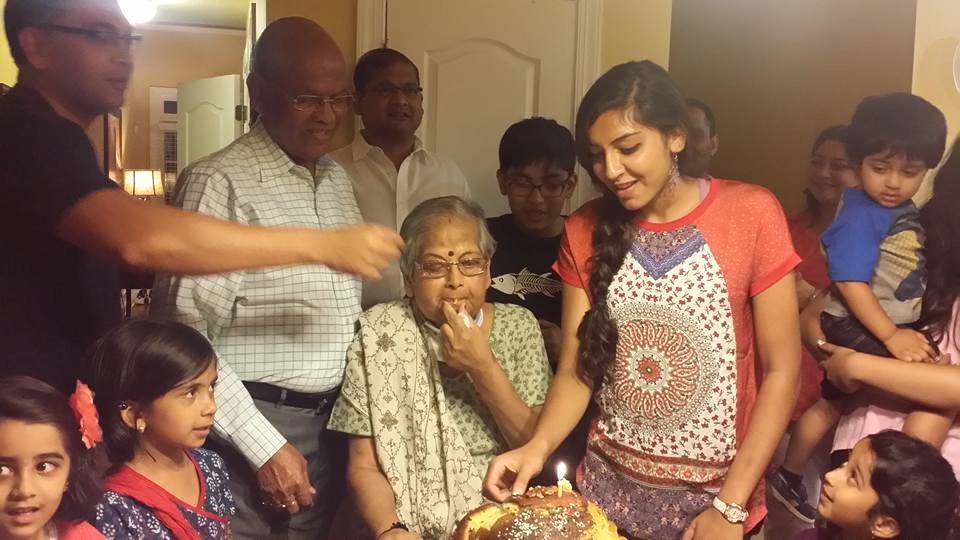
My daughter, Malvika, graduated from High School with exemplary grades, and was accepted for a place at Georgia Tech, a premier university. On 13 June, we threw a big party for her at a restaurant, with about a 100 guests. Ma came out to the party with her nurse, and sat there the entire time. She was enjoying seeing so many people. Malvika, her cousins who were visiting from India, and Malvika’s friends had put together some dances, which looked spectacular.
After those dances, I made a speech to thank everyone for attending. Most of the attendees knew about what had been happening with Ma. I ended my speech with a special mention of the fact that she had almost left us in February, but how she was doing better now, and how happy we were that she was able to be with us. Ending the speech, I walked over to be with her. For the first time since she had been diagnosed, her eyes brimmed with tears and she was overcome by emotion. I held her and said to her, gently, that it was such a surprise to see her cry now, after everything she had been through. It really was. She was a very tough woman. She had shown she could hold it together under circumstances that would break most people’s will.
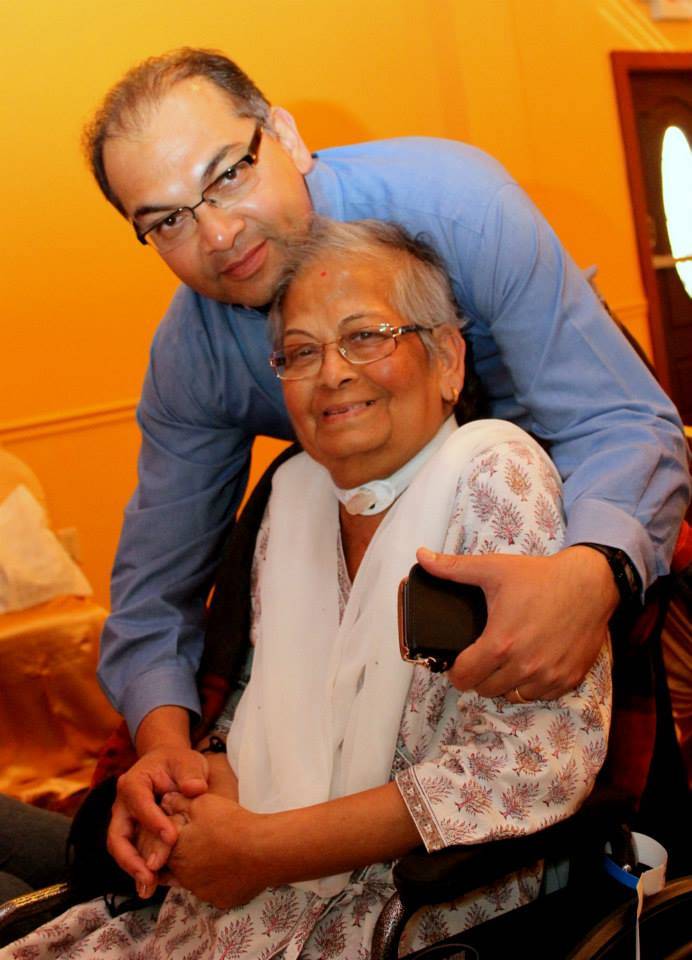
It almost felt like the good old days, with our big parties and all the singing and dancing.
All this time, what my uncle had said to me in December 2014, about how Ma would survive if she made it past June, was playing in my mind. Back in December 2014, I had assumed it was a fantasy because Ma would never make it past June 2015. We were now at the end of June 2015. Was there hope?
During the last week of June, approximately two months after her PET scan and her surprisingly good results, we noticed that cleaning Ma’s breathing tube had become a little more difficult to clean. Introducing a thin suction tube into her breathing tube used to be smooth, but we could feel a slight obstruction now. Pushing past this obstruction resulted in slight scratches to her trachea, and a minimal level of blood. It wasn’t dangerous, but it was a matter for concern.
Her blood pressure and her sodium levels were also out of control. She had another hospital stay. The doctors adjusted her medication, and put her on a different, stronger blood pressure drug. She returned with things back under control.
We called her oncologist to set up her next PET scan. It was scheduled for 30 June, but I made a mistake and we arrived too late. It was rescheduled, and she had her scan on July 1.
On 2 July, I received a call from Dr. Krishnamachari at 8 am. He asked me how Ma’s physical condition and demeanor was, and I explained that there were some areas of concern, but she was generally alright. He then gave me her results. The cancer was back, and it had come back with a vengeance. All her tumors were larger and more active. In addition, it had spread to the bones in her right shoulder and right leg. He mentioned that she could receive radiation on the bones to ameliorate the pain. All in all, it was the most devastating phone call I have ever had in my life.
I waited until Papa woke up. Ma was weaker, and was sleeping until later during those days. I told Papa about the call. We decided that Ma needed to know right away. She probably had a short time left, which was why she had to make her decisions about what she wanted to do during that time.
Every morning, after waking up, Ma and Papa would spend some time on the porch, looking out towards the garden. Ma awoke at about 10 am. Soon, she and Papa were sitting on the rocking chairs out on the porch.
I stood in the flower-bed, on the other side of the railing on the porch. Ma was right in front of me, across the railing.
Papa opened the conversation, telling her that the doctor had called with her results. She gestured at him to stop and asked me to hold her hand. For the first time in the entire span of her illness, I saw fear and dismay on her face. I think she knew already.
Papa told her what the results were. I was crying. Ma looked very disappointed. Papa explained to her that there were still treatment options, and we weren’t going to give up. Do you want continued treatment, he asked her. With disarming and total trust, she asked what we thought she should do, because she would do whatever we thought was right. How can you not feel the need to protect someone when they put their life in your hands like this? We agreed that we would pursue radiation therapy to go after the tumors and bone cancer.
I called her oncologist, but he had proceeded on vacation. Arranging radiation through his office proved to be time-consuming. We finally managed to get an appointment at the radiation clinic for 8 July. They were doing us a favor by getting us in that quickly, so they told me they would call me on the 8th to let me know when she could come in.
At this point, she was getting weaker every day. She spent a lot of her waking time looking out of the window into the forest behind my house. I believe her will to live had left her after this latest setback. I don’t blame her one bit. She had already shown me the meaning of toughness, and it has nothing to do with how big and brawny you are. Nobody should be forced to face so many reverses, so much discomfort, so much constant pain. The only reason she wasn’t in bed all the time, waiting to die, is because – I believe – she knew how much we loved her, and especially how much I loved her. Bhavya did point out at the time that Ma was hanging on because she was so attached to me, and I to her.
Between 2 and 3 July, 2015, some other very disturbing things happened. Our basement flooded in the afternoon on 2 July. By the evening, we had called in plumbers and emergency repair personnel, and they had literally torn the floor and part of the walls in the basement out. They also cleared the problem in the pipes that had caused the flood. Finally, they left several giant fans and dehumidifiers running before they left for the night. This equipment would run for 72 hours to really dry the basement out.
On 3 July, Ma had a new daytime attendant. She seemed to feel that Ma needed to talk to her, for some reason. Ma was in no mood to talk. At about 1 pm, 8 hours before she was supposed to leave, the attendant came and told us that it “wasn’t working out”, and she was going to leave. We paid her and she left.
The most disturbing event was yet to happen. Our house is in an area with a lot of forest, and sometimes deer venture out of the trees and walk around outside our house. That day, in the early afternoon, two deer ran around the house, and decided to jump over my neighbor’s fence to run back to the trees. That fence has spear-tipped posts. The tips are not that sharp, but one of the deer didn’t make it over the fence and dropped with some force on the tips and impaled himself. The poor animal hung there, thrashing, until a policeman came out and shot it to put it out of its misery.
Ma was already depressed. She felt like these were bad omens, giving her signs that nothing was right in the world. That day, 3 July, we moved her to Dabloo’s house, both for a change of scenery and to get her away from a place where there had been so many disturbing events.
Every day, we would spend time together. In the evenings, sometimes the four of us, the original nuclear family, which was my parents, my brother, and I, would find ourselves alone. The other members of the family were out for one reason or the other. We didn’t do much, just sat around and talked. She joined in a little, but mostly she just sat around, happy that we were around her, smiling at our jokes and soaking in our love for her.
Her blood pressure started climbing again on July 7, 2015. Dabloo and Papa were keeping a close eye on her, trying to get the pressure down, but by the evening, her pressure was showing no signs of staying down. Her sleep, too, had been fitful, and she just didn’t seem to want to sleep, despite repeated entreaties. When I arrived at Dabloo’s house at about 7 pm, Ma was sitting back on the white sofa where she usually spent her days. Bhavya and I sat near her, and I spoke with her while holding her hand. I asked her if she was anxious. Yes, she replied. I asked her why she didn’t try to sleep, and she responded that she was afraid to go to sleep. “Do you feel that you won’t wake up if you go to sleep?” I asked. She nodded yes. I told her I was going to sit there and hold her hand, and I would let nothing happen to her, so she could go to sleep. As I held her hand and massaged her arm, she dropped off to sleep. Her pulse dropped to a less elevated level.
After about 30 minutes, she was up again. Her blood pressure and pulse were back up to dangerously high levels, while she was also also sweating profusely. I told everyone it was time to call an ambulance.
Within a few minutes, the ambulance was at the door. Before she went out to the ambulance, Ma asked us if all the children had eaten, since it was getting late in the evening. Assured that they had, she got into the ambulance. Papa and Dabloo followed in a car, and I sat with the driver in the ambulance, talking to her so that she knew I was close.
At Northside Hospital, the doctors and staff knew Ma well. As they worked on her to get her heart rate and blood pressure down, she began to sweat as if someone had turned on a tap! I used a wet towel to repeatedly wipe off the sweat and cool her down.
A doctor took me aside and told me what was obvious: her throat was very constricted, because her tumor was obstructing it. Trying to put in a suction tube to clean her airway had produced a lot of fresh blood. If this continued, her chances of survival were very low.
Of course I knew this moment was going to come, but it still didn’t feel real. She couldn’t go. She was still here, still breathing, still sweating. How could she just stop being here?
I went back to taking care of Ma. Eventually, the staff managed to bring her heart rate and blood pressure down to somewhat normal levels. She became more comfortable. The sweating stopped.
I had stepped out of the room for a few minutes. When I returned, she was alert and awake. As she saw me walk toward her, she did something that we had always associated with her: she raised both eyebrows twice, quickly, with a smile. That had always been her way of asking what was up. I smiled back, and held her hand. Papa, Dabloo, and I talked to her and tried to keep her comfortable. Slowly, she drifted off to sleep.
Bhavya arrived around midnight. The plan was that I would go home and come back in the morning. Natasha was already at the hospital. She would take care of Ma in the night. Papa and Dabloo would leave as soon as Ma was taken to her room.
On the way back home, I was inconsolable. I couldn’t stop feeling that this was the end, but I didn’t want it to be. I couldn’t eat or drink. I kept crying out for Ma, hoping something would happen to bring her back the way she had returned in February.
Bhavya, to her credit, pointed out what I have come to realize was absolutely accurate. She told me that perhaps I didn’t see it, but Ma and I loved each-other so much that she was hanging on because I didn’t want her to go. She needed to go now, Bhavya said, because she was in great discomfort and pain. But I had to tell her that I was alright with her going, because otherwise she would just resist moving on.
That sounded right. I knew how attached she was to me, and I to her. I finally stopped crying and sunk into an exhausted slumber at about 2:30 am.